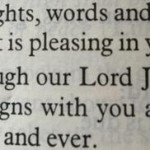I was considering doing a series of posts on the various “communal” prayers which are said at Mass.
It’s struck me for a while, now, that we Catholics, who begin each Mass with a Penitential Rite meant to free us from the lesser – not grievous or mortal – sins, have been short-changing ourselves by our choice in how we do it.
In most parishes today, the Penitential Rite will be a series of affirmations tied in to the Kyrie, so you might hear something like this:
“Lord Jesus, You are the Light of the World and our Salvation, Lord Have Mercy” (to which the congregation replies, “Lord Have Mercy”)
There follows two more affirmations coupled with the rest of the Kyrie: Christ have mercy; Lord have mercy. Then the priest says, “May Almighty God have mercy on us, forgive us our sins and bring us to everlasting life.”
And the congregation says: “Amen.”
There’s nothing wrong with that, of course. It’s not bad. But it is part and parcel of the whole, “never let us think ill of ourselves” mentality that has so distorted our concept of sin and its reality in our lives. While admitting to nothing, we tell the Lord that we know He’s great and merciful, and ask His forgiveness. Seems just a little too tidy, doesn’t it? A little too passive and bland? And a little too sterile?
Before this Rite selection became the standard, we had a different one – a prayer that demanded just a little bit more of ourselves, as we would recite together:
I confess to almighty God,
and to you,
my brothers and sisters,
that I have sinned through my own fault,
in my thoughts and in my words,
in what I have done,
and in what I have failed to do;
and I ask blessed Mary,
ever virgin,
all the angels and saints,
and you,
my brothers and sisters,
to pray for me to the Lord our God.
The Rite itself used to be referred to as the Confiteor and pre-Vatican II it was also a munch longer – though not necessarily better – prayer. But compared to the newer, less self-accusing Rite that is so prevalent today, when you said this prayer, you were saying something about yourself that was utterly true. You were standing amidst the rest of your fellows and saying, “I blew it. I am all that is human and fallible, and I failed you, I failed myself, I failed God. Please pray for me.”
The prayer is a confession, but it’s also a great leveler. There may be an 80-year old in the pew before you, and an 8-year old behind you, but you’re standing in solidarity, recognizing that we’re all in the same boat, that we’ve all – sometime in the past week – done what humans do: we’ve screwed up. We see, too, that our actions do not happen in a vacuum, that when we screw up out of selfishness, or self-interestedness, or whatever, we affect the larger society in ways small and large. We realize that it’s beyond stupid to sit in judgment of one’s neighbor’s splinters when one is walking around like a right porcupine, oneself.
And we make ourselves just a little bit vulnerable, and vulnerability is often the crack by which grace can enter in.
I have sinned through my own fault,
in my thoughts and in my words,
in what I have done,
and in what I have failed to do;
Who can’t identify with that? Who can’t look back on a week and not shake their heads in self-disappointment at at least some of what one has done? And yet we come to Mass, to the Word, to prayer, to Communion, and we stand together…and we confess our commonality. We are more alike than we sometimes want to admit. And yes, we do things that create distance between each other, between ourselves and who and what we love. We create distance between ourselves and God. We sin.
At some point in every life, the ugly and dark stuff intrudes. Seems to me the best and healthiest way to deal with it, when it comes, is to have more than a passing acquaintance with it – if you’re acknowledging on a daily (or weekly) basis that what is lesser – and baser – exists and resides within our own hearts right next to all of our highest and purest ideals, you’re much less likely to be shocked or overwhelmed when you encounter the dark, either within yourself or within others. Or even within your town or your church or your government.
This is why the Catholic church urges daily (or at least weekly) examinations of conscience. It’s fallen out of practice, of course, like confession (which is the natural response to an Examination of Conscience). These days society and Dr. Phil tell us we are not to “dwell” on what we do wrong (”you just made a mistake…”) but to examine one’s conscience is not to “dwell;” it is not “wallowing in Catholic guilt,” as some would say. Rather, we examine the conscience in order to be in touch with that baser nature that exists within us – for to ignore it is to allow it to run amok at one’s own peril. Like a child whose parents won’t discipline him because it might make him feel bad, our unattended to conscience can do a lot of rationalized and relativistic damage to our souls and hence to our lives and the lives of those around us. If you’re attending to it – if you’re actually looking at what you’re doing – clearly and honestly – the self-awareness is helpful.
The thing is…it’s helpful, the examination of conscience; it’s a gift. But like many gifts, it’s a real pain in the ass, too. If you’re being honest with yourself, it’s a stinging anti-septic.
And if you’re not…well…then you can poison yourself.
The Confiteor is a useful prayer, a means by which one may start to do more than passively lay about, snug-in-grace, and start to actively, consciously work at doing better.
I need to do better. Just as soon as I’m done coughing up this gunk, I’ll talk about that.
Related:
On Confession.
On Confession, Part II











